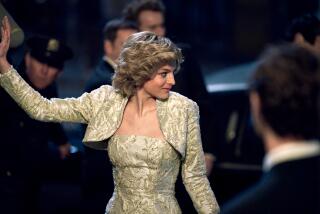MOVIE REVIEW : Lifting the Skirt on Profumo ‘Scandal’ of ‘60s
- Share via
“Wet your lips” is the murmured phrase that runs through “Scandal”--a whispered hint to make beautiful young women’s mouths glisten and pout even more seductively. Think Brigitte Bardot and you get the image.
“Scandal” is the cracklingly well-acted British film about the 1963 sex-and-politics scandal that rocked Great Britain, causing the resignation of War Minister John Profumo and eventually toppling the Tory government. (“Scandal” closes the AFI/L.A. FilmFest tonight and opens Friday at selected theaters.) The film has already made its own headlines with its MPAA-appealed ratings change from its original X to an R, after relatively minuscule snips and a few additions.
Wetting one’s lips, teetering on 4-inch heels, furthering one’s career by “dates” which spiraled headily up the social ladder--these became second nature for girls of voracious ambition and some sense of their own allure in Britain’s hypocritical late 1950s. Or, as the snugly Establishment Stephen Ward explains the very upper classes to 17-year-old cabaret showgirl Christine Keeler: “Anyone who can enter that world has to be very clever or very beautiful.”
As “Scandal” would have it, letting Keeler (Joanne Whalley-Kilmer) take care of the beauty and Ward (John Hurt) handle the clever department made it a dicey partnership from the first.
Ward, whom the tabloids would later delight in calling “the society osteopath,” was adjusting the backs of such notables as Averell Harriman, deposed King Peter of Yugoslavia, Ava Gardner and J. Paul Getty when Keeler came under his practiced eye. In no time he had changed her brassy blond hair dark, to set off her enormous brown eyes.
Ward, charming and unattached, was on everyone’s guest list. He knew the tastiest-looking girls. He had a weekend cottage on the fringes of Lord Astor’s ancestral Cliveden, leased to him for 1 per year from his chum “Bill,” Lord Astor. Life was pretty much Ward’s oyster and Christine became his black pearl.
But Ward, who had delusions of himself both as a diplomat and as an asset to British secret service, could never keep his mouth shut. And Christine, although canny and a quick study, looked to him for guidance and some sense of the real workings of his world. Unfortunately, he had none.
That becomes “Scandal’s” focus: Keeler’s love for and loyalty to the wickedly amusing Ward, their falling-out and his eventual undoing at the hands of the aristocracy, who cut him loose without a second thought when lurid stories hit the tabloids. He was, after all, a vicar’s son from a minor public school. Not exactly one of them.
The film holds because of the brilliance of Hurt and the fascination of Whalley-Kilmer, as well as the sly, tongue-in-cheek viciousness of Bridget Fonda’s Mandy Rice-Davies. If it is spotty in continuity, Michael Thomas’ screenplay demonstrates his good ear for talk, above and below stairs, such as Ward’s ingrained manners that let him charm Christine’s mother with the same offhanded grace that he chats up guests at an orgy. (A naked but notably discreet orgy, as befits the film’s R-rating.)
Director Michael Caton-Jones, perceptive with actors, has also caught the fevered, faintly illicit flavor of these tatty Soho clubs where foreign businessmen mixed with English aristos and frisky, wide-eyed girls from the country, newly minted as “dancers” and “actresses.”
From this launching pad and under Ward’s protection, Keeler met the available spectrum of politics and society, including a Soviet naval attache, Eugene Ivanov (Jeroen Krabbe), and, ultimately, John Profumo, impeccably played by Ian McKellen, down to the war minister’s distinctive balding hairline which makes him look like Koko in “The Mikado.” Before long, both men were paying court to Keeler, by this time platonically sharing Ward’s fashionable mews flat.
Peculiarly, “Scandal” doesn’t seem to American audiences to condemn the real villains of the piece. Presumably British audiences know the film’s cheerless subtext full well: that the spectacle of the uppermost classes rallying around one of their own, choosing a scapegoat and suppressing the truth has changed not one jot since the seamy days of 1963. To Americans, “Scandal” seems only a righting of the wrong done to Ward, a reasonable but not precisely broad-scale theme on which to build a movie.
Also, Americans may not be able to draw an immediate bead on the moral climate of that day with the ease of English audiences, and the film does little to fill them in. Part of the scandal touched on the possibility that Keeler was passing British military secrets from her British lover, Profumo, to her Soviet lover, Ivanov. The British remember bitterly what Americans may not: the defections of Burgess and MacLean to the Soviet Union a few years earlier.
If we cannot quite share the film’s subtext, it still contains two luscious performances. Hurt makes the enigmatic Ward irresistible. Struck sideways by Keeler’s beauty, he becomes at once mentor, best friend, the most inspired gossip and . . . unassailably platonic.
Walley-Kilmer, who managed to be interesting even in “Willow,” proves that she was made for the lingering appraisal of a camera. She uses stillness and a few measured movements of her enormous brown eyes to suggest Keeler’s preternatural appeal; such deliberate aloofness covers the bare spots in Keeler’s education and lets her appear mysterious rather than dim. It’s an amazing collaboration of artist and medium.
The film suggests that Ward’s plight went unnoticed by his fellow Britain. Not quite so. His funeral may have gone unattended, but, as one of his biographers noted, there were two wreaths, one with 100 carnations from a group including John Osborne, Kenneth Tynan, Joe Orton and Penelope Gilliatt, with a card that read, “To Stephen Ward--Victim of Hypocrisy.”
More to Read
Only good movies
Get the Indie Focus newsletter, Mark Olsen's weekly guide to the world of cinema.
You may occasionally receive promotional content from the Los Angeles Times.










